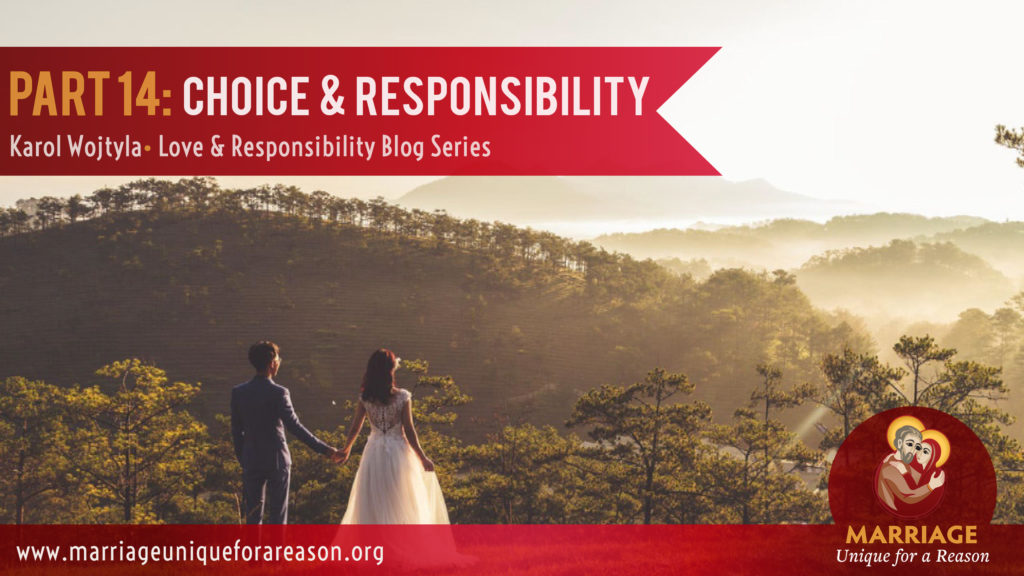
A Responsibility for One’s Own Love:
This part of Love and Responsibility is perhaps the crux of Wojtyla’s argument in the book—“Choice and Responsibility.” A human person has a “responsibility for one’s own love,” he says, and this responsibility is “immense.”[1] It is only recognized as such by someone who understands the value and worth of the human person—a person is a child of God, worth the blood of God’s Son! A person who knows this will be careful about how he or she approaches relationships. Wojtyla notes that a man (or a woman) who does not understand the worth and dignity of others, “will 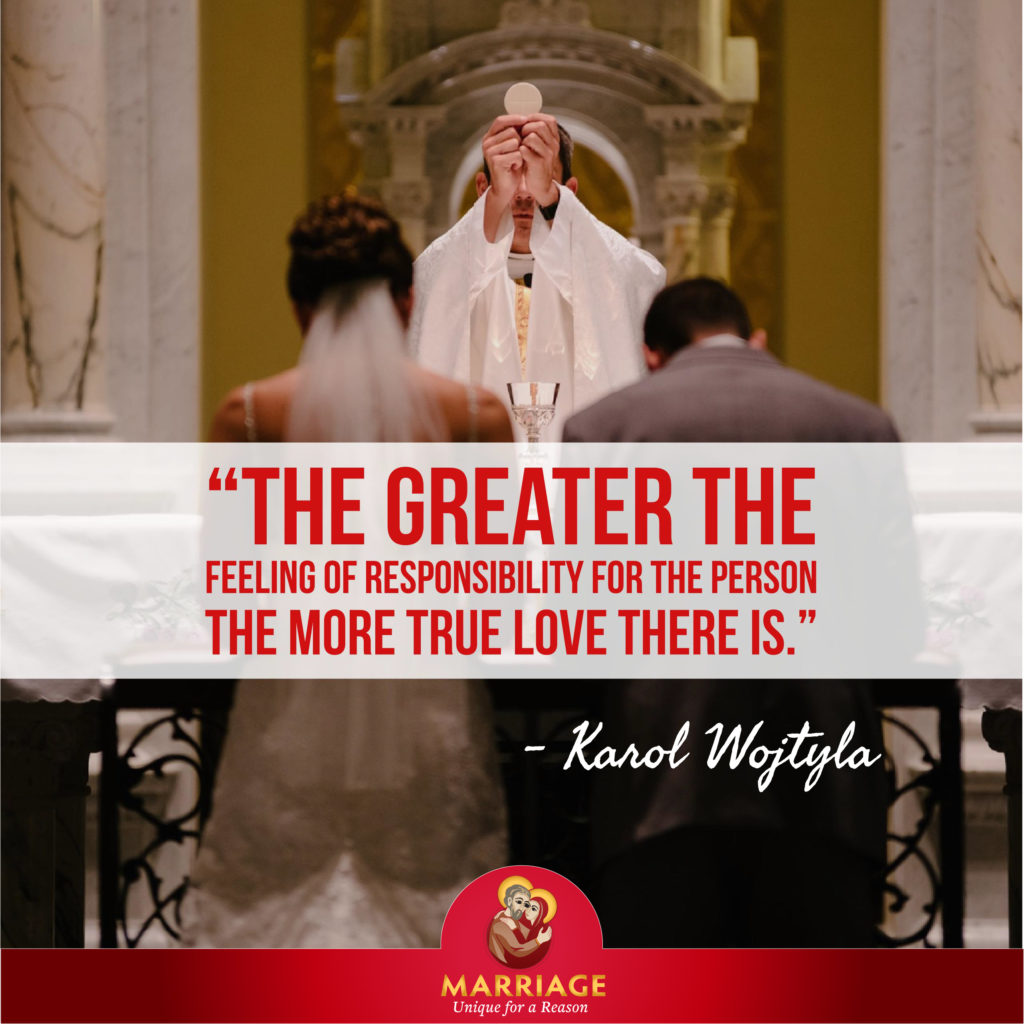 complicate his own life and that of others by letting the reality of love, its true ‘relish,’ escape him.”[2] Someone who never sees the deeper reality of what love is, is bound to hurt other people.
complicate his own life and that of others by letting the reality of love, its true ‘relish,’ escape him.”[2] Someone who never sees the deeper reality of what love is, is bound to hurt other people.
When I read the above, I think of my friend Sally’s[*] father. He left her and her mom when Sally was three; remarried and divorced again when Sally was in elementary school; remarried and divorced again when she was in college… to say that this man “complicated his own life and that of others” is perhaps an understatement. Sally was hurt by every one of those changes and reasonably questions whether marriage can ever be permanent, whether she ever wants to be married. Her father never seemed to care about the effects of his choices on his daughter. He is an example, to me, of a person who does not feel responsibility for other people. Wojtyla says, “The greater the feeling of responsibility for the person the more true love there is.”[3]
Relationships Involve Choices:
Relationships involve choices. Before a man and a woman can pledge their love to one another, “each face the choice of the person on whom to bestow the gift of self. Its consequences makes the choice a weighty matter.”[4] Marriage is (obviously) not a decision to be taken lightly. Dating and engagement ought to be a time of discernment, asking and then verifying that one’s choice of spouse is the right one. Choosing one’s partner in marriage, “is as though one were choosing another ‘I,’ 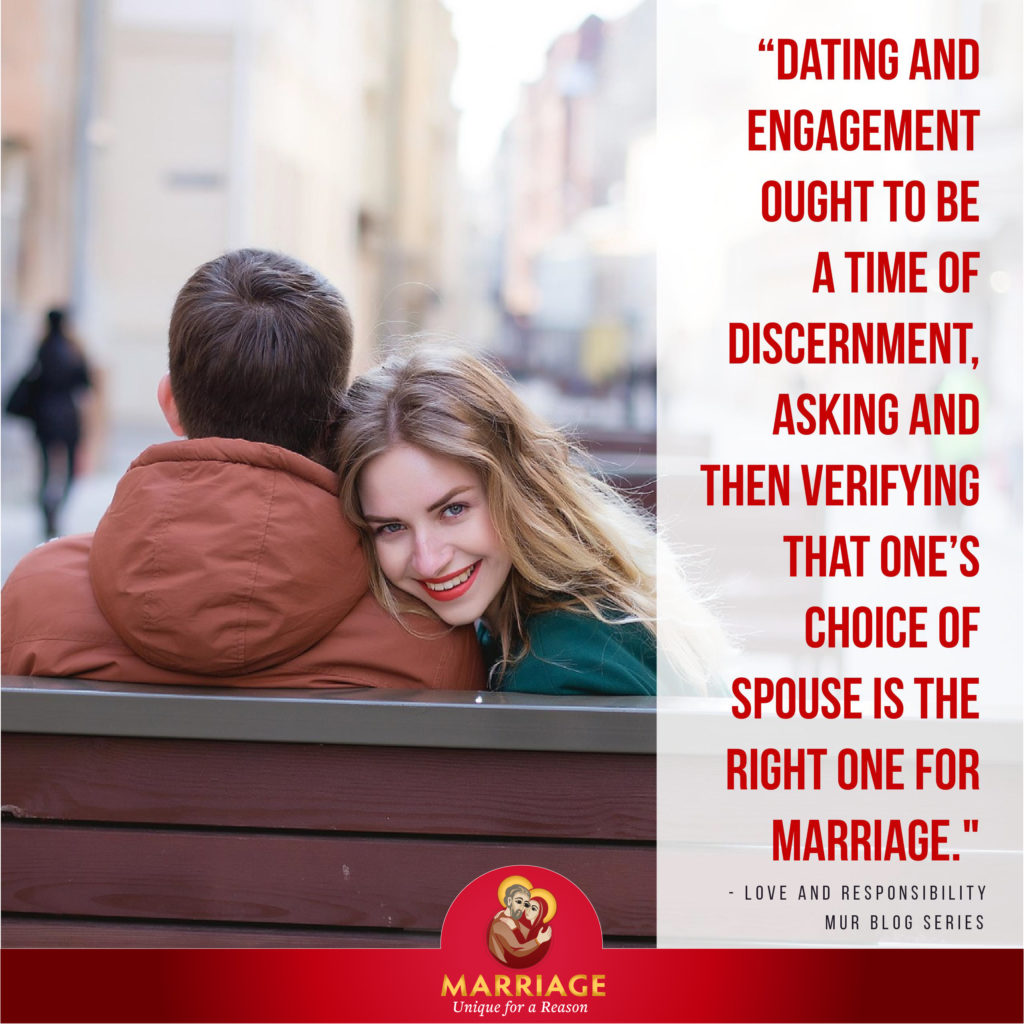 choosing oneself in another, and the other in oneself… in order not merely to live with another but to live by and for that other person, he must continually discover himself in the other and the other in himself.”[5] One’s spouse must be like another self.
choosing oneself in another, and the other in oneself… in order not merely to live with another but to live by and for that other person, he must continually discover himself in the other and the other in himself.”[5] One’s spouse must be like another self.
No one can really explain why one person chooses another, Wojtyla notes. Certainly sexual attraction plays a part, but only the choice of this person (not this body) can be considered valid for marriage. “True love is one in which we choose the person for the sake of the person,”[6] not for the sake of having sex, having children, or in order not to be alone. Whether one has chosen wisely will be discovered as time goes by. “Life will determine the value of a choice and the value and true magnitude of love.”[7]
Love and Marriage:
Love will be tested in marriage. Sexual interest may fade and fatigue set in; two people who once vowed to be all to one another may feel like strangers. “Nothing then remains except the value of the person, and the inner truth about the love of those concerned comes to light,” Wojtyla writes. “If their love is a true gift of self, so that they belong each to the other, it will not only survive but grow stronger, and sink deeper roots… only when love between human beings is put to the test can its true value be seen.”[8] If life was always easy, we would not really find out how real our love is.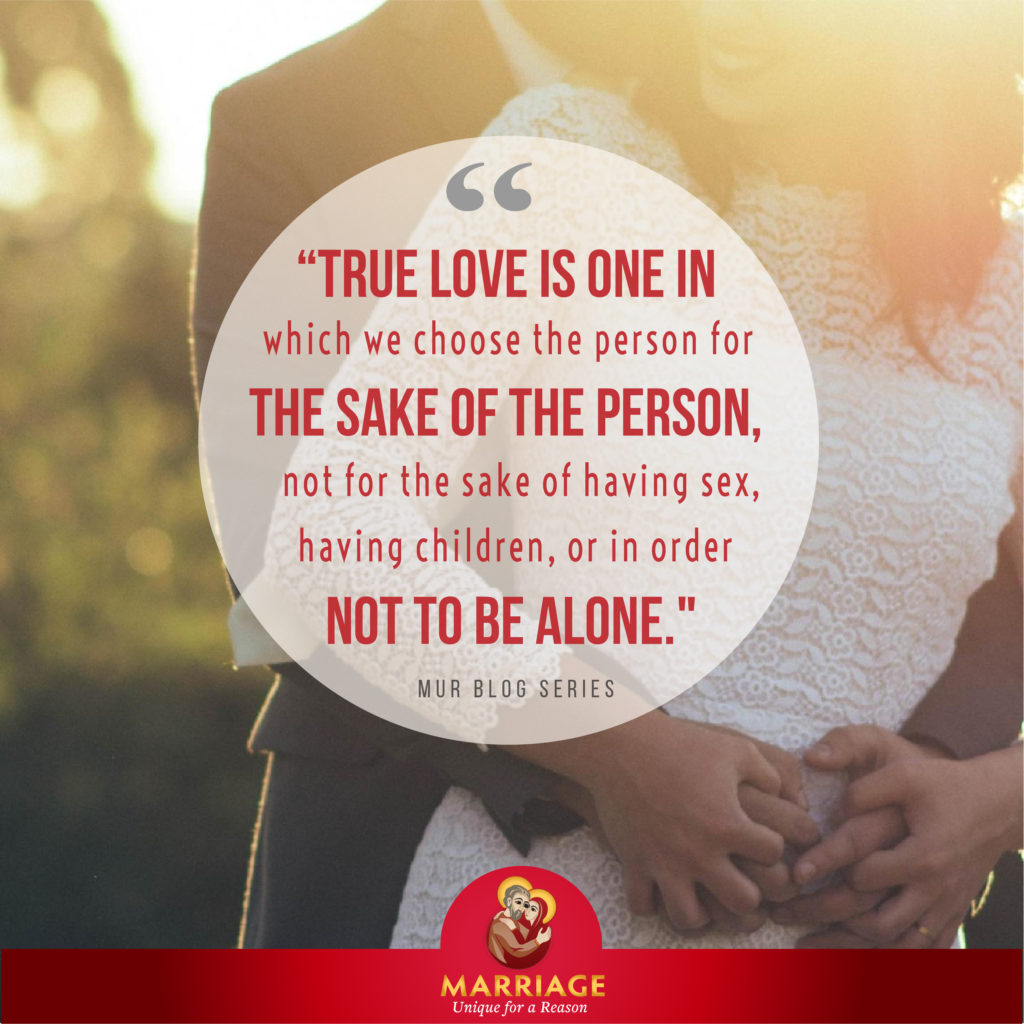
I see an elderly couple at Mass sometimes; the woman is in a wheelchair and she cannot speak. Her husband appears to take such good care of her, pulling her up to the front of the church, fixing her cardigan so that she won’t get cold, and smiling at people who come up to greet them. That is what true love looks like; it’s not easy, but it’s beautiful.
While emotions and desires change and fluctuate, a love which has matured within the subject frees itself from this anxiety by its choice of person.”[9] True love, based on the value of the person, “makes us feel emotional love for the person as he or she really is, not for the person of our imagination, but for the real person.”[10] At a certain level, this love is not dependent on the person’s virtues and lives on in spite of his or her faults. The strength of love shows itself most when the loved one fails in some way (makes mistakes, even sins). “One who truly loves does not then withdraw his love, but loves all the more, loves in full consciousness of the other’s shortcomings and faults, and without in the least approving of them. For the person as such never loses its essential value.”[11]
More on how this choice happens next time!
You can read ALL of MUR’s Love and Responsibility blog series in the link below: http://www.marriageuniqueforareason.org/category/love-and-responsibility/
[*] Not her real name.
[1] Wojtyla, Karol. Love and Responsibility (San Francisco: Ignatius Press, 1993), p. 130.
[2] Ibid, p. 130.
[3] Ibid, p. 131.
[4] Ibid, p. 131.
[5] Ibid, p. 131.
[6] Ibid, p. 134.
[7] Ibid, p. 134.
[8] Ibid, p. 134.
[9] Ibid, p. 134.
[10] Ibid, p. 135.
[11] Ibid, p. 135.
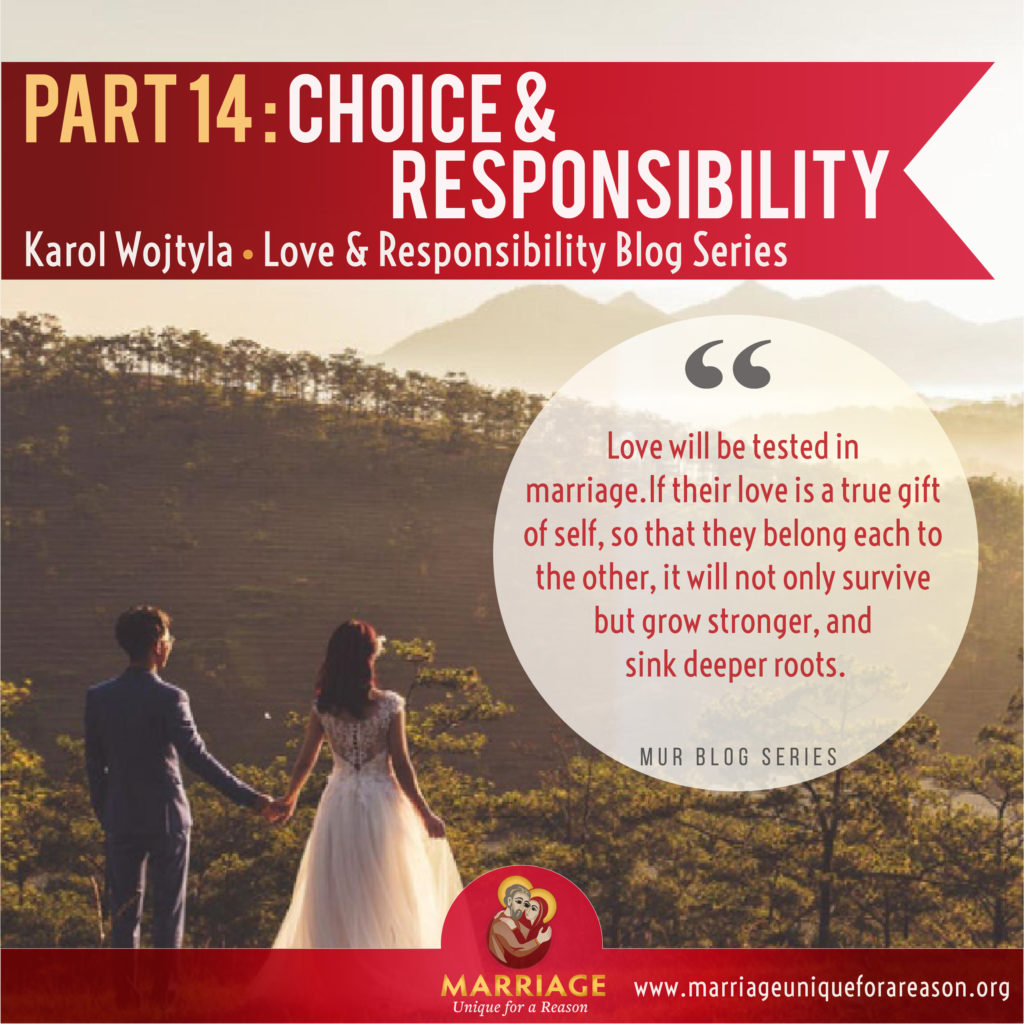
The blog before blog #14 is not cited accurately to mean something at odds with what Karol Wojtyla states previously about citation footnote number 6 where in the paragraph the citations properly close. But to add that the other motives are Not the reason, will contradict the inclusive priority in addition to the primary personal reason for choosing a person so he states in page 133: “Primary reason does not mean sole reason….” Otherwise, that statement would be to mean a this or that mentality rather than a not only or merely but also or primarily. Through his philosophical work Karol was thoroughly balanced and truthful to his Thomist and personalitic philosophy and a proper citation would be best prescribed here. Thank you. JMJ
I would be happy to clarify whatever point you think needs to be clarified, but it is not clear what you are referencing. Do you mean that it is in the 13th entry?